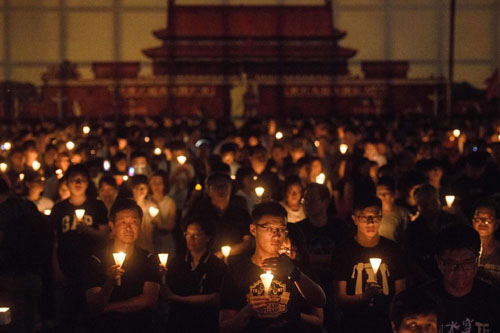by WorldTribune Staff, June 3, 2019
June 4 marks the 30th anniversary of the Tiananmen Square protests, when the Chinese government in a bloody and brutal crackdown sent troops to fire on students, activists and other people demonstrating for democracy and against the Communist Party.
China’s government, per its usual conduct on the Tiananmen anniversary, has increased censorship efforts, even reportedly targeting social media accounts outside of China.

Twitter, at least initially, seemed willing to join the Communist Party in suppressing accounts of those critical of China, reports say.
“The hundreds of thousands of protesters who gathered in Beijing and in other cities around China suffered grievously in pursuit of a better future for their country,” Sec. of State Mike Pompeo said in a statement today.
“The number of dead is still unknown,” he added.
Yaxue Cao, founder and editor of China Change, a U.S.- based English-language about human rights and law in China, “tweeted over the weekend that many Chinese-language Twitter accounts critical of China had been suspended, even if they originated from outside of China, including some based in the U.S.,” Tech Crunch reported on June 3.
Several of the accounts Cao mentioned, including @Sasha_Gong and @wmeng8, have since been restored, “but users were frustrated by Twitter’s explanation, especially since the suspensions affected so many Chinese dissident accounts, and called on the company to investigate potential causes,” Tech Crunch noted.
Twitter claimed on its Public Policy account that it had suspended accounts mostly for “engaging in a mix of spamming, inauthentic behavior, & ban evasion.” Addressing the suspension of accounts that “were involved in commentary about China,” Twitter’s Public Policy account claimed that contrary to speculation, “these accounts were not mass reported by the Chinese authorities — this was a routine action on our part. Sometimes our routine actions catch false positives or we make errors. We apologize. We’re working today to ensure we overturn any errors but that we remain vigilant in enforcing rules for those who violate them.”
U.S. Senator Marco Rubio tweeted: “.@twitter has apparently suspended a large number accounts that are critical of #China including accounts of people outside of China. Twitter has become a Chinese govt censor.”
Tech Crunch noted that video-sharing sites Bilibili and AcFun began in May to suspend real-time comments, while Douban E Zu (the name translates to “Douban Goose Group”), a popular celebrity gossip and news forum with more than 600,000 members, halted service between May 30 and June 29. Both services claimed they needed to perform “system maintenance.”
Online discourse is already strictly controlled by the Chinese government, which requires all websites to do real-name checks on users when they register an account (for example, by linking phone numbers, which are tied to government-issued IDs). Discussions on Douban E Zu often center around politics, which may have prompted heavier restrictions. Real-time comments (called “bullet screens”) on Bilibili and AcFun are harder to monitor for banned content and even though the government recently issued new guidelines for screening comments on bullet screens, censors may still be working on ways to maintain control on them.
Most recently, WeChat, the ubiquitous messaging, games and e-commerce platform, blocked users from changing their headshots, alias and What’s Up status. Then this weekend, users began reporting connection issues with their VPN services, which are used to get around mainland China’s “Great Firewall” and access forbidden sites.
Intelligence Brief __________ Replace The Media
